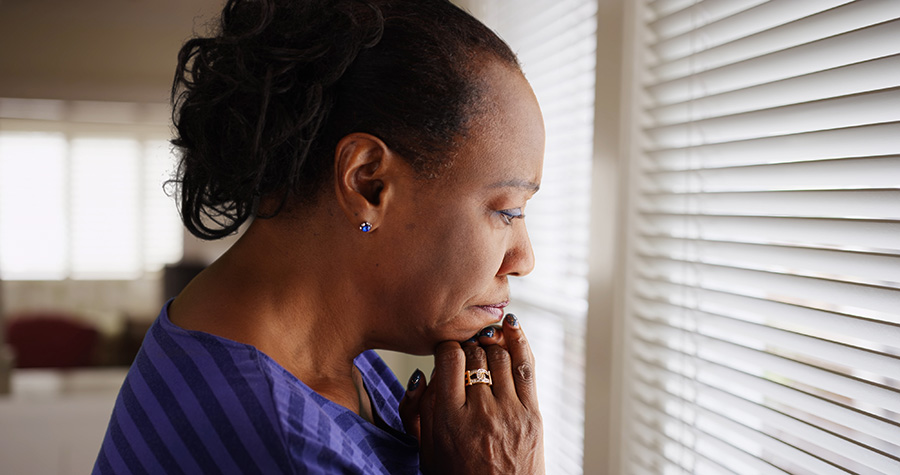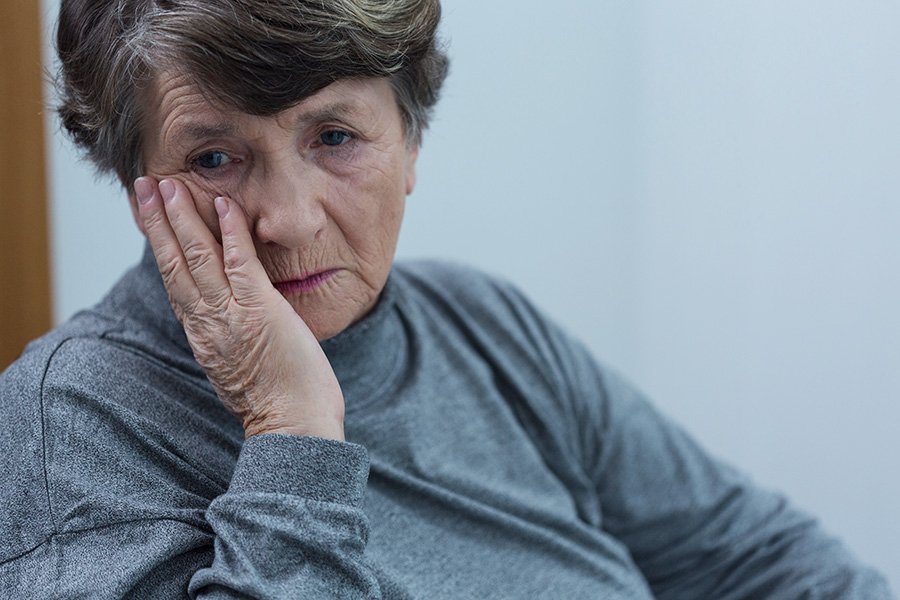Aging and Mental Health
As we get older, our physical health can often decline. That means adjusting to new health problems, having less independence or adapting to a new environment. These kinds of health changes coupled with life events like retirement or loss of a spouse can have a big impact on mental health.
Mental health problems in seniors often go unnoticed. This coupled with the stigma associated with having mental health problems, inhibits seniors and their families from seeking help.
With all these life and health challenges, one might begin to believe that a decline in mental health is just another part of the normal aging process. Not so!
About 1 in 4 seniors experience a problem with their mental health at some point in their older years. The most common problems are depression, dementia and anxiety. Depression and dementia are the most common and affect just 5% to 7% of the population over age 60. Anxiety is a close second, affecting 3.8% of older adults.
Grateful
The holidays are coming. You might be feeling anxious or excited. But whatever you may be feeling, Thanksgiving is a time to be grateful. Focus on all the blessings in your life instead of the negatives. Then, imagine how you can extend this season of gratitude to improve how you feel year-round.
Thanksgiving time is a special season. It’s connection with gratitude is ingrained in the holiday. This is more than being thankful. Thankfulness is a fleeting feeling when someone does something nice for you. But gratitude is a state of constant thankfulness. It’s a deep appreciation for all that life brings…both the good, and the bad.
The mental health needs of older adults is unique and often transitory. Seniors face many emotional events like moving to a new home, dealing with the death of a loved one and changes in physical health. All these will impact mental health. The most common issues faced by older adults are:
Depression Is NOT A Normal Part of Aging
Everyone feels blue or sad now and then but these feelings usually don’t last long and do not interfere with daily life and normal function. But with depression, symptoms continue over weeks, making daily activities very difficult.
- Feeling sad or “empty”, hopeless, anxious
- Feeling very tired and loss of interest in favorite activities
- Lack of concentration and focus
- Not being able to sleep, or sleeping too much
- Overeating, or not wanting to eat at all
- Thoughts of suicide, suicide attempts
- Aches or pains, headaches, cramps, or digestive problems.
How Is Depression Treated?
Antidepressants: may take several weeks to work and can have side effects
Psychotherapy: can help people with relationships and situations contributing to the depression Electroconvulsive Therapy (ECT): recommended when medicines and therapy don’t work.
Causes: There’s no one cause of depression. Sometimes it’s genetic. Other times depression may be caused by past physical, sexual or emotional abuse. Depression may be the result of a reaction to death or loss, serious illness, personal problems or substance abuse.
Depression vs. Dementia…What is the difference?
Depression is marked by a rapid mental decline, but memory of time, date and awareness of the environment remains. Motor skills are slow, but normal in depression.
Dementia is marked by a slow mental decline with confusion and inability to recognize familiar locations. Writing, speaking and motor skills are impaired. People suffering with dementia often do not think they have a memory problem.
Early Signs of Dementia
It’s totally normal to misplace your wallet or forget the names of your kids’ friends every so often. But while some memory lapses are no big deal, others could signal the beginnings of dementia. Dementia includes Alzheimer’s disease, frontotemporal disorders, and Lewy body dementia.
Nutritional deficiencies, side-effects from medications and emotional distress can all produce symptoms that can be mistaken for early signs of dementia…or depression. Consequently, it is important to consult a doctor if you notice cognitive changes.
Anxiety
Common fears about aging can lead to anxiety. Many older adults are afraid of falling, being unable to afford living expenses and medication, being victimized, being dependent on others, being left alone and death.
Manage Your anxiety. Keep active. Eat well.
Spend time outdoors in nature, Spend time with family and friends, Reduce stress, Do activities you enjoy
Substance Abuse In The Elderly
Seniors may be more susceptible to substance abuse. Normal life changes may trigger increased anxiety and depression and difficulty with focus and decision-making. This can lead to alcohol and substance abuse.
Because seniors are more likely to be taking multiple medicines and supplements, the chances of drug interactions and misuse increases. Typical abuse situations can occur when using opioid pain medicines, marijuana, nicotine and alcohol.
The most effective treatments for substance abuse are family/group therapy and cognitive-behavioral therapy. Therapy can help patients change their thoughts and behaviors so they can better cope with the stresses of life. Relationships are improved. Negative thinking patterns are reduced. Emotions are better managed.
Social Isolation & Loneliness
Loneliness and social isolation might sound similar, but they are not necessarily the same. Some people live alone but have an active social life. Conversely, others may have people around them all the time yet feel lonely. Humans are a social species. Losing connections with others can impact health. Social isolation and loneliness has been linked to conditions like high blood pressure, obesity, heart disease, weak immune system and cognitive decline.
Dealing with Grief
Everyone, at times, suffers deep grief over the death of a loved one. Is deep grief a mental illness? Medical experts term deep grief as “complicated grief disorder” when symptoms last more than 6 months. Symptoms may include:
- A powerful pining for the deceased,
- Great difficulty moving on
- A sense that life is meaningless
- Bitterness/anger about the loss
Medications can help with the depression and cognitive therapy techniques commonly used to treat Post Traumatic Stress Disorder (PTSD) can help with the intense yearning for the deceased loved one.
Seasonal Affective Disorder
Seasonal Affective Disorder (SAD) is often referred to as “winter blues”, and thought to occur just during the fall and winter seasons. However, after further study, SAD is considered to be more than a seasonal mood disorder. It is a recurring major depressive disorder that resolves within months. It is treatable with light therapy, talk therapy and medications.
- As with general or seasonal depression, there are self-care steps you can take:
- Regular exercise outdoors, if possible
- Healthy sleep habits with a predictable sleep/wake cycle
- Healthy diet with limits on sugary foods and foods high in carbohydrates
Season’s Eatings
Make Good Choices!
By eating just 200 extra calories a day …a piece of pecan pie, a tumbler of eggnog, a couple latkes, a few butter cookies…you could pack on several pounds over the holidays. That doesn’t sound like much, except few people shed that extra weight in the following months and years.
Try the 80/20 Rule
Eighty percent of the time, follow your healthy lifestyle of exercising and eating properly. But twenty percent of the time, most often the weekends and holidays, you can lighten up and not be too tough on yourself. As long as you keep to the 8-/20 balance, you will not gain weight. Besides that, you will have more fun. Keeping to your regular routine 80% of the time will help you manage your stress, boost your immune system and avoid overeating and weight gain. Remember it’s going to be hard to lose those pounds in January!
Treat Yourself…Pace Yourself
- Eating too much is just part of holiday gatherings. Wait! It doesn’t have to be that way. You don’t need to deprive yourself.
- Don’t eat everything at the party. Be choosy and spend your calories on foods you really love.
- After you have finished your plate, don’t get second helpings right away. Take 10 minutes to enjoy the company. Drink some water. It takes time for your stomach to tell your brain, “I’m full.”
- Don’t stand next to the food table. It makes it harder to reach mindlessly for food as you talk.
- Eat a healthy snack before you go so you don’t overeat. Don’t go to the party on an empty stomach.
- Choose more vegetables especially those that are not slathered in creamy or buttery sauces.
Alcohol and Aging
It takes less alcohol to become intoxicated when you are older because of slowing metabolism. Vision and hearing problems and slower reaction times are also common in older adults. So don’t drive if you have had several drinks. Even more important is the danger of mixing over-the-counter prescription medicines with alcohol. Older adults may take multiple prescription medicines while drinking alcohol, which can be very dangerous because of drug/alcohol interactions.
Have a Happy Holiday!











Comments are closed.